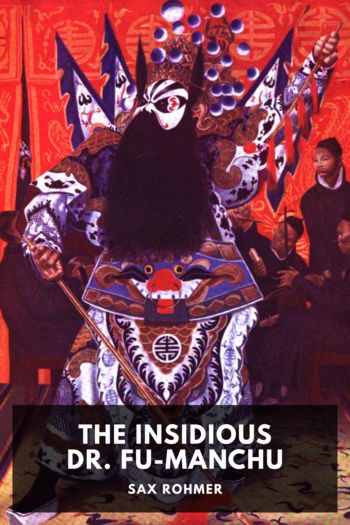The Insidious Dr. Fu-Manchu by Sax Rohmer (english novels for students .txt) 📕

- Author: Sax Rohmer
Book online «The Insidious Dr. Fu-Manchu by Sax Rohmer (english novels for students .txt) 📕». Author Sax Rohmer
“Sit down, Mr. Weymouth,” he said. “I am not entirely surprised. But you have my attention. What has occurred?”
Weymouth took a cigarette from the box which I proffered and poured out a peg of whisky. His hand was not quite steady.
“That knocking,” he explained. “It came again the night after you were there, and Mrs. Weymouth—my wife, I mean—felt that she couldn’t spend another night there, alone.”
“Did she look out of the window?” I asked.
“No, Doctor; she was afraid. But I spent last night downstairs in the sitting-room—and I looked out!”
He took a gulp from his glass. Nayland Smith, seated on the edge of the table, his extinguished pipe in his hand, was watching him keenly.
“I’ll admit I didn’t look out at once,” Weymouth resumed. “There was something so uncanny, gentlemen, in that knocking—knocking—in the dead of the night. I thought”—his voice shook—“of poor Jack, lying somewhere amongst the slime of the river—and, oh, my God! it came to me that it was Jack who was knocking—and I dare not think what he—what it—would look like!”
He leaned forward, his chin in his hand. For a few moments we were all silent.
“I know I funked,” he continued huskily. “But when the wife came to the head of the stairs and whispered to me: ‘There it is again. What in heaven’s name can it be?’—I started to unbolt the door. The knocking had stopped. Everything was very still. I heard Mary—his widow—sobbing, upstairs; that was all. I opened the door, a little bit at a time.”
Pausing again, he cleared his throat, and went on:
“It was a bright night, and there was no one there—not a soul. But somewhere down the lane, as I looked out into the porch, I heard most awful groans! They got fainter and fainter. Then—I could have sworn I heard someone laughing! My nerves cracked up at that; and I shut the door again.”
The narration of his weird experience revived something of the natural fear which it had occasioned. He raised his glass, with unsteady hand, and drained it.
Smith struck a match and relighted his pipe. He began to pace the room again. His eyes were literally on fire.
“Would it be possible to get Mrs. Weymouth out of the house before tonight? Remove her to your place, for instance?” he asked abruptly.
Weymouth looked up in surprise.
“She seems to be in a very low state,” he replied. He glanced at me. “Perhaps Dr. Petrie would give us an opinion?”
“I will come and see her,” I said. “But what is your idea, Smith?”
“I want to hear that knocking!” he rapped. “But in what I may see fit to do I must not be handicapped by the presence of a sick woman.”
“Her condition at any rate will admit of our administering an opiate,” I suggested. “That would meet the situation?”
“Good!” cried Smith. He was intensely excited now. “I rely upon you to arrange something, Petrie. Mr. Weymouth”—he turned to our visitor—“I shall be with you this evening not later than twelve o’clock.”
Weymouth appeared to be greatly relieved. I asked him to wait whilst I prepared a draught for the patient. When he was gone:
“What do you think this knocking means, Smith?” I asked.
He tapped out his pipe on the side of the grate and began with nervous energy to refill it again from the dilapidated pouch.
“I dare not tell you what I hope, Petrie,” he replied—“nor what I fear.”
XXIXDusk was falling when we made our way in the direction of Maple Cottage. Nayland Smith appeared to be keenly interested in the character of the district. A high and ancient wall bordered the road along which we walked for a considerable distance. Later it gave place to a rickety fence.
My friend peered through a gap in the latter.
“There is quite an extensive estate here,” he said, “not yet cut up by the builder. It is well wooded on one side, and there appears to be a pool lower down.”
The road was a quiet one, and we plainly heard the tread—quite unmistakable—of an approaching policeman. Smith continued to peer through the hole in the fence, until the officer drew up level with us. Then:
“Does this piece of ground extend down to the village, constable?” he inquired.
Quite willing for a chat, the man stopped, and stood with his thumbs thrust in his belt.
“Yes, sir. They tell me three new roads will be made through it between here and the hill.”
“It must be a happy hunting ground for tramps?”
“I’ve seen some suspicious-looking coves about at times. But after dusk an army might be inside there and nobody would ever be the wiser.”
“Burglaries frequent in the houses backing on to it?”
“Oh, no. A favorite game in these parts is snatching loaves and bottles of milk from the doors, first thing, as they’re delivered. There’s been an extra lot of it lately. My mate who relieves me has got special instructions to keep his eye open in the mornings!” The man grinned. “It wouldn’t be a very big case even if he caught anybody!”
“No,” said Smith absently; “perhaps not. Your business must be a dry one this warm weather. Good night.”
“Good night, sir,” replied the constable, richer by half-a-crown—“and thank you.”
Smith stared after him for a moment, tugging reflectively at the lobe of his ear.
“I don’t know that it wouldn’t be a big case, after all,” he murmured. “Come on, Petrie.”
Not another word did he speak, until we stood at the gate of Maple Cottage. There a plain-clothes man was standing, evidently awaiting Smith. He touched his hat.
“Have you found a suitable hiding-place?” asked my companion rapidly.
“Yes, sir,” was the reply. “Kent—my mate—is there now. You’ll notice that he can’t be seen from here.”
“No,” agreed Smith, peering all about him. “He can’t. Where is he?”
“Behind the broken wall,” explained the man, pointing. “Through that ivy there’s a clear view of the cottage door.”
“Good. Keep your eyes open. If a messenger comes for me, he is to be intercepted, you understand. No one must be allowed to





Comments (0)